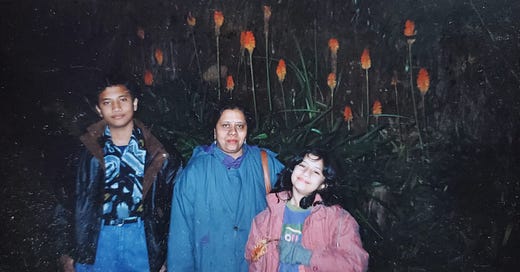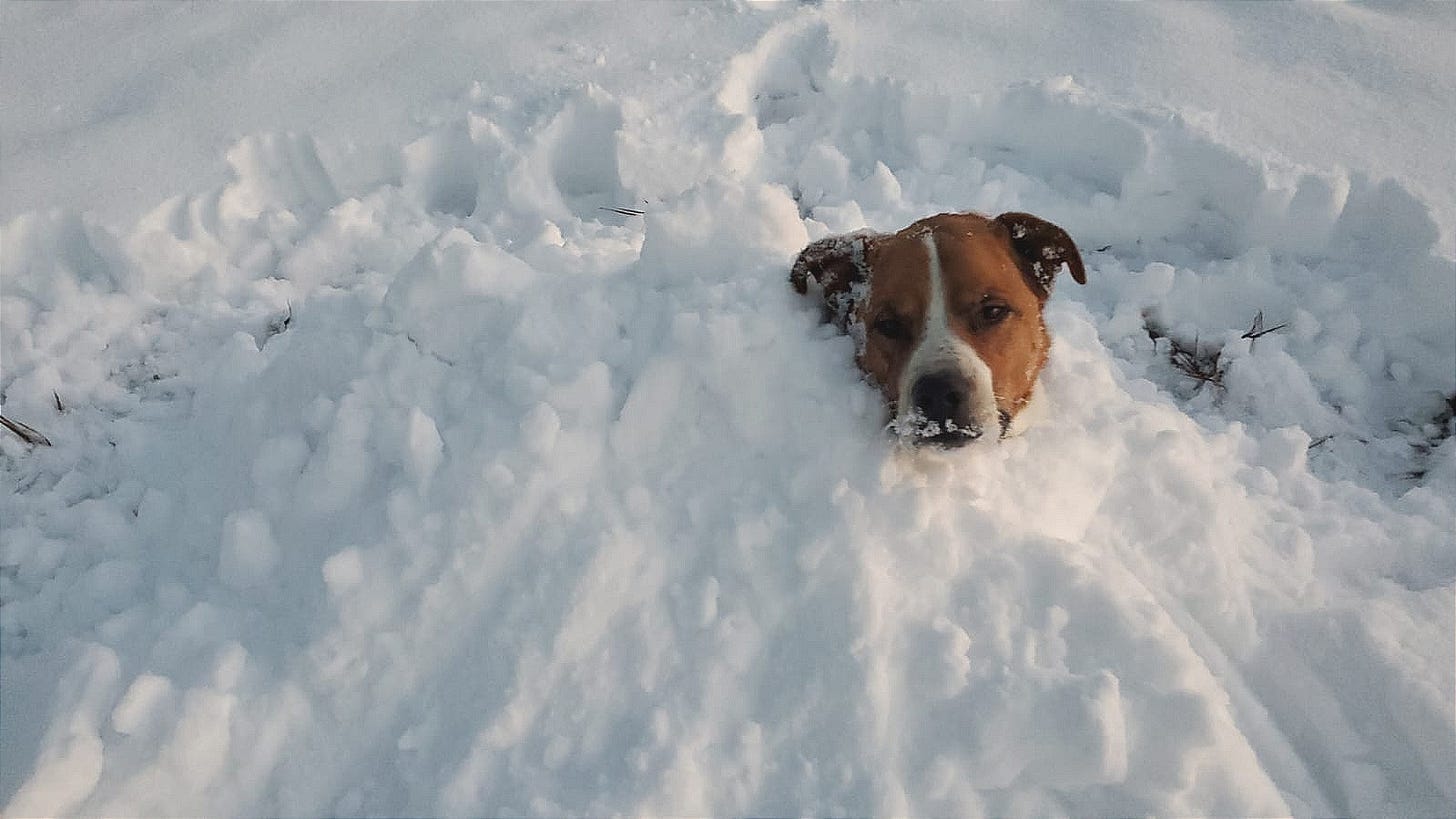Hello friends,
I’m writing to you from Denver, where we finally got our first big snowfall a couple of weeks ago. Like many immigrants from the non-Western world, I have a strange relationship to snow. As a child, first in India and then Oman, I spent years yearning for snow and everything American TV shows had taught me to associate with it: carrot-nosed snowmen, hot chocolate before a fire, Xmas trees with shiny presents underneath. Snow represented the opposite of all I knew, an exotic and dreamlike world.
I still remember the first time I actually touched snow, in New Zealand. I was eight or nine, and my family was considering moving there. We had a comfortable life in Oman, my dad making good money in the country’s vast oil fields. But the West still represented something better, shinier.
Most days during our six-week sojourn in NZ, my dad donned a cheap suit, slicked back his hair, and trudged to interviews. Meanwhile, my mom schlepped my brother and I from one tourist site to another.
We saw many things: waterfalls, baby seals, kiwi birds. But all I wanted to see was snow. Locals kept telling us it would come any day now, but it didn’t and didn’t and didn’t. Our trip was drawing to a close, and so too was my hope. Then finally, it happened.
I still remember how the evening light shifted before the first flakes swirled down. How delicate they were, their icy taste on my tongue. My brother and I built snowmen with our bare hands, moaning at the pain throbbing our fingers. It’s one of my most vivid memories: our swollen red hands, the bright white world.

We didn’t end up moving to New Zealand. We went somewhere much colder: western Canada. It won’t surprise you to hear that winter and snow quickly lost their magic for me. I came to despise the long, grey months when my hair froze waiting for the bus and my toes ached from the cold. When I was old enough to drive, I hated taking the wheel in the winter, tires slipping on streets sheered by black ice and my breath catching in my throat.
In my twenties, I became an aidworker, leaving Calgary for Turkey, then Mali, then Uganda. For years, I basked in those countries’ tropical temperatures, their long hours of sunshine and their humidity that glistened my skin. I spent the most time in Uganda, which lies on the equator, meaning the temperature tends to be similar all year-round. Whole months and years flowed by with the landscape remaining largely untouched, at least to my outsiders’ eyes. I aged and changed, but my surroundings barely did, which disconcerted me. At some point, I started missing the things that usually punctuated time: the first spring blooms, the glorious yellowing and falling of leaves, their noisy crunch beneath my boots. And snow; glorious, terrible snow.
Now, I’m back in North America, but climate change is scrambling all traditional markers of temporal change. Across the street, my neighbors’ roses are still blooming (!). This morning, I sat on my balcony in a T-shirt. The grass is still green, and it frightens me.
The big snow a couple of weeks ago was a respite. For a few days, white piled our sidewalks and frosted tree branches like whipped cream. The prospect of imminent loss sharpens the present, revealing its ephemerality. Walking my dog, I delighted in snow the way I did all those years ago in New Zealand: with the joy and surprise of, if not a child, then at least someone who no longer takes those soft white crystals for granted.
One day, on our violently warming planet, there will be a last snow. But not yet. Not yet.
Welcome to “Stranger Ties”
For a long time, I’ve wanted an online space to engage with friends and readers that is not social media. Twitter / X feels both toxic and irrelevant. Instagram is exhausting, though I am on there. Like many writers, I crave is something akin to the blogs of the early aughts. A forum to share thoughts in more than 200 characters that is also not limited by a magazine’s editorial mandate or voice. I want to write about whatever I want. I didn’t know, for example, that I wanted to write about snow until I sat down at my desk—but that is one of the joys of writing: how it surprises you, teaches you about your own delights.
I must confess, though, the other reason for starting this newsletter is rage. I’m angry at the state of American politics, but even more at the response of well-meaning liberals to the latest election. Not a day—not an hour!—goes by when I don’t hear someone either assigning blame or preaching “community” as our savior. All that mattered up until the election was systemic change; all that seems to matter now is “solidarity” and “networks of care.”
I’m going to write more in another newsletter about why those terms and the way they’re being instrumentalized is harmful. For now, I’ll say this: as someone who spent years trying to tackle poverty and inequality in Africa and the Middle East, and also someone who now reports on marginalized communities in America fighting for their rights, there’s a lot missing from current conversations on these ideas - and also a lot to learn from the experiences of communities, aidworkers, organizers and artists outside our borders. I hope to get into some of that in future dispatches.
Other newsletter topics will include international politics / foreign policy; racial melancholy; and estrangement, both personal and cultural. As a south Asian Canadian woman who’s lived and worked in a few different places in several industries, and also someone estranged from much of her biological family, I’ve spent much of my life thinking about belonging and kinship—about what we owe each other across lines of race, class, and nationality.
I hope to write once or twice a month—and I hope these missives will offer something of value to you. You can subscribe below to make sure you don’t miss a post.
Until next time,
Raksha






can’t wait to read, raksha!
It’s a pleasure to discover your work, Raksha. Fellow development worker / writer here. I look forward to following your work.